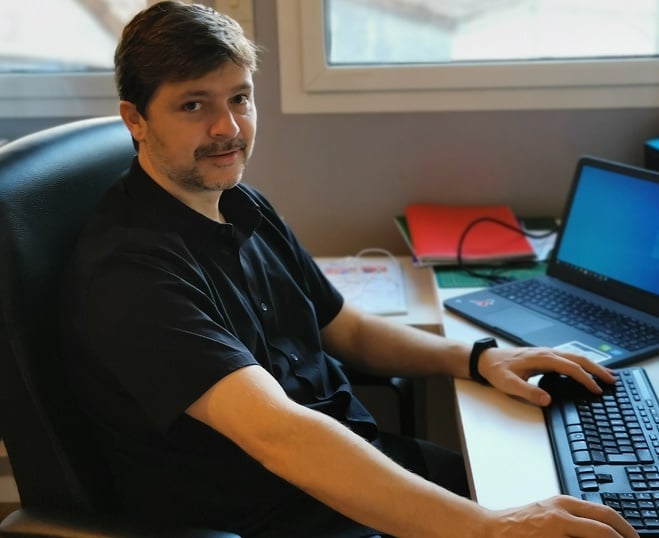Interview with Marcelo Versiani, R & D Data Scientist
Interview with Marcelo Versiani, R & D data scientist at VRCF in Aulnoye-Aymeries
12/11/2020 – Careers
Marcelo Versiani, aged 39, has been working at Vallourec for 11 years now, first in Brazil, and then in France where he recently joined Vallourec’s multicultural talent pool as a data scientist at VRCF (Vallourec Research Center France) in Aulnoye-Aymeries.
Hello Marcelo, how would you describe your career path?
I was born in Ouro Preto, Minas Gerais in Brazil and studied at Belo Horizonte.
After graduating in Control and Automation Engineering (UFMG, Belo Horizonte), I first worked at Exxon Mobil and later at Accenture consulting group. During this time I decided to gain deeper knowledge of the metals and mining segment by taking a specialist degree course in steel-making (UFOP, Ouro Preto). Six years later, I joined Vallourec which was looking to hire an expert in process optimization, modeling and control.
Over the last few years, I have lived the digital revolution on a daily basis, with plants getting more and more connected, the growing multiplicity of information sources, and increasingly smart models and systems.
It became clear to me that smart data was going to be a major challenge for the years to come. So I decided in 2016 to return to university to obtain a master’s degree in computational intelligence. I felt it was important to complete my background and years of experience in the field with an academic qualification.
You moved to France in 2019, how has the experience of living abroad gone?
It’s been an incredible journey for me, both professionally and personally.
In Aulnoye-Aymeries, at the research center, we work in a multicultural environment, with daily interactions with the different Regions or corporate functions.
Learning how to cope with a new culture, learning a new language, getting to know other colleagues with different ways of thinking, and understanding better how the company works has been a great experience.
It is also a fantastic opportunity for my whole family. It’s very enriching for the children and a positive step for their future.

What is your current mission at Vallourec?
Today, my mission is to help VRCF become a true center of excellence in data science, to develop projects in this area and to federate a community of data scientists.
This requires a combination of both human and operational approaches. Firstly, it means building a strong team through hiring and/or training. Secondly, setting up appropriate internal procedures to support the infrastructure with the right tools for data storage and processing.
Data is generated continuously throughout Vallourec’s business chain, from tube production to sales, as well as human resources and finance. It can be analyzed and used to support the decision making process.
Some examples of our collaboration include working with the RDPE (Department in charge of OCTG Plain Ends R&D) to develop models for predicting pipe collapsepressure, with corporate services to use data to improve our results in OCTG tenders, and with the thermic process community to propose models for predicting mechanical properties. This illustrates how data scientists can contribute to problem solving in all areas of our business.
What do you enjoy most in your job and what do you find the most difficult?
In data science, depending on the subject you are working on, you may need to become familiar with a variety of areas like production, metallurgy, marketing or sales. So you have to remain open-minded and curious. You can’t just rely on your basic knowledge.
It’s an incredibly vast field. Each new domain you tackle is like starting a new job. It’s really fascinating and is what makes the job so interesting.
But in an industrial environment where physics, metallurgy, and other scientific knowledge have been around for years, it’s sometimes difficult to convince people to use data science until they really know what’s going on behind it. It’s not easy to ask them to simply trust this new way of working.
What is the aim of the data science community you are developing?
In this worldwide community of nearly 200 people, everyone has a piece of the puzzle. Our goal is to put all these pieces together and show the entire company all the benefits of this science for our business so that everyone can embrace it.
It’s essential to know what local teams are developing, to feel the trends, to know what works best. Networking within the community is key.
Its members are widely spread geographically, often do not know each other and come from diverse cultures, so it may be difficult to bring them together, but it’s the richness of this experience that helps us to look at problems from different perspectives to eventually find the most appropriate solution.
To strengthen this community, we have set up a very strong and international core team, responsible for motivating teams in their area.
In addition, we keep up to date of what’s going on by attending external conferences or reading publications. We also work with external specialized partners who provide us with their expertise.
What advice would you give to a young graduate considering a career in data science?
Data is going to be more and more present in our daily lives and if you’re looking for something that’s on the cutting edge, something attractive for the job market and that’s going to grow in the future, it’s a very good choice!
Study hard, be curious and don’t forget that data science is not just about technology, but more importantly it is all about knowing the subject. So the more you understand the subject behind the data, the more likely you are to succeed.
